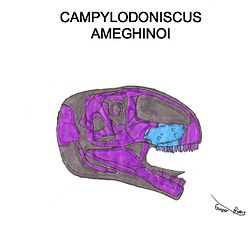Plants
Angiosperms
| Name | Novelty | Status | Authors | Age | Unit | Location | Notes | Images |
|---|---|---|---|---|---|---|---|---|
Sp nov | Valid | A maple, described from petrified wood | ||||||
sp nov | Valid | |||||||
Gen et sp nov | valid | A moon seed relative. | ||||||
| |||
|---|---|---|---|
| +... | |||
Paleontology or palaeontology is the study of prehistoric life forms on Earth through the examination of plant and animal fossils . [1] This includes the study of body fossils, tracks ( ichnites ), burrows , cast-off parts, fossilised feces ( coprolites ), palynomorphs and chemical residues . Because humans have encountered fossils for millennia, paleontology has a long history both before and after becoming formalized as a science . This article records significant discoveries and events related to paleontology that occurred or were published in the year 1961.
| Name | Novelty | Status | Authors | Age | Unit | Location | Notes | Images |
|---|---|---|---|---|---|---|---|---|
Sp nov | Valid | A maple, described from petrified wood | ||||||
sp nov | Valid | |||||||
Gen et sp nov | valid | A moon seed relative. | ||||||
| Name | Novelty | Status | Authors | Age | Unit | Location | Notes | Images |
|---|---|---|---|---|---|---|---|---|
Gen et comb nov | Kuhn | A dubious phytosaur, possibly a chimera; | ||||||
| Name | Novelty | Status | Authors | Age | Unit | Location | Notes | Images |
|---|---|---|---|---|---|---|---|---|
Gen et comb nov | Kuhn | Late Triassic (Rhaetian) | Dubious non-dinosaurian archosaur; | |||||
Gen et comb nov | Kuhn | Late Triassic (Carnian) | A pseudosuchian of uncertain affinity. [6] | |||||
Data courtesy of George Olshevsky's dinosaur genera list. [7]
| Name | Novelty | Status | Authors | Age | Unit | Location | Notes | Images |
|---|---|---|---|---|---|---|---|---|
Gen et comb nov | Kuhn | Junior synonym of Astrodon . |  | |||||
Gen et comb nov | Kuhn | A possible titanosaur |  | |||||
Gen et sp nov | Junior synonym of Pachysauriscus . | |||||||
| Name | Novelty | Status | Authors | Age | Unit | Location | Notes | Images |
|---|---|---|---|---|---|---|---|---|
Sp nov. | valid | An Anatidae. | ||||||
Gen et Sp nov. | valid | Brodkorb | An Anatidae, type species E. russelli. | |||||
Sp. nov. | valid | Brodkorb | A Rallidae. | |||||
Sp. nov. | jr synonym | Brodkorb | An Anatidae, | |||||
Sp. nov. | valid | Brodkorb | A Palaelodidae. | |||||
Gen et Sp. nov. | valid | An Odontophoridae | ||||||
Sp. nov. | valid | Brodkorb | ||||||
Sp. nov. | valid |
| ||||||
Sp. nov. | valid | Miller |
| |||||